This post is sponsored by The Dylan Tonkin Show!
Dylan is very relatable and his relaxed interview style allows the conversation to come effortlessly with his guests.
He has successfully hiked the Pacific Crest Trail in 2018, and the Appalachian Trail in 2016. He brings loads of experience to the table along insights for hikers of all levels.
Dylan brings thoughtful questions and great guests who are not short on entertaining stories!
If you are into the outdoors, hiking and enjoy hearing interesting podcasts, please tune in to Dylan! You can find Dylan at the links below!
Where Are You Spending Your Time?
If you are like most hikers (and me) you have likely spent more hours than you care to admit debating your gear choices in your head, with a hiking partner, the cat, or any random stranger.
It can be fun to scour the interwebs for the best deals and settle on the kit that will become your new life for weeks or months on a hike. I live for that type of analysis and preparation, it helps me feel confident in my choices and I feel productive doing it.
Don’t get me wrong here, these decisions are important. You want to be happy, comfortable, and confident with the gear you have selected. There is a problem though.
It’s a huge effort that doesn’t actually make or break your hike success.
You are putting your time and resources in a place that deserves far less attention. A 10 degree sleeping bag vs a 20 degree bag will not be the deciding factor in whether or not you cross that finish line. Meeting a thru-hiker or section hiker who quit their hike because their sleeping bag was not the right temperature rating is beyond rare.
 Like Yeti sighting rare.
Like Yeti sighting rare.
If those hikers are being truly honest, gear is not likely the real reason they quit their hike.
A simple gear upgrade would suffice; quitting the trail entirely is a bit dramatic for a small gear problem.
This goes for sleeping pads, puffy jacket choice, backpack options, cooking system, tent choice, shoes, trekking poles, and all of the other items you happily agonize over bringing.
There is a mountain of other issues that may also factor in like finances, family, jobs, lost desire, unmet expectations, weather, fires, etc. Simply put, there are a lot of things working against you and your hike.
What does matter and where should you spend your energy?
Training is where you need to spend your time and energy. Your fitness level determines your body’s ability to manage the physical stress. Of course, being strong mentally will also be a key factor in your success.
Most hikers suffer their injuries in the first 25% of the trail, taking weeks off the trail to heal if they get back at all. That tells you everything you need to know about how important being physically prepared is. The current completion rate is not fully known, but loads of hikers suffering trail ending injuries by mile 500 or quiting for other reasons.
Having a better base level of fitness before you start your hike reduces the physical stress when you start hiking day after day after day. That is what will buffer you against common overuse injuries like stress fractures, plantar fasciitis, shin splints, along with knee pain, hip, and low back pain.
Having fitness will ALWAYS be a positive benefit. Having fitness is NEVER a negative asset. NOT having fitness is always a negative asset.
Reframe Your Priorities To Be Successful!
Some hikers will naturally have a stronger fitness level starting out, and feel that no training is needed at all. For them, that may be true. They have enough innate fitness to buffer common overuse injuries.
However, it’s just crappy advice to tell the other 99% of hikers hitting the trail that you don’t need to train.
“Others didn’t train and they finished so why should I train? I’ll be fine”.
It’s not enough to just think you’ll be lucky, that you’ll be just fine, or that training isn’t important. You are not being honest with yourself, and it will likely cost you an epic and life changing adventure.
If you are serious about your hike, then you owe it to yourself to honestly prepare as best you can to reach your goal. I happen to disagree with the “no training needed” viewpoint, obviously. There are scores of hopeful, yet unlucky injured hikers who will back me up.
Being fit allows you to spend your time looking at trees and mountains instead of huffing and puffing up hills staring at your feet in a projectile sweat. Why not enjoy your hike?
Throw a 35+ pound loaded pack onto your untrained body and it’s going to suck. A lot. You cannot short cut fitness. If you started training a minimum of 8 weeks (12-16 weeks is more ideal) before your start date by you’d be in a much better place to begin your hike. The muscles will be efficient, you will feel strong and your cardiovascular base will be improved through your training.
Download the free article on ways that you can improve your odds of being successful during your through hike!
What About Age?
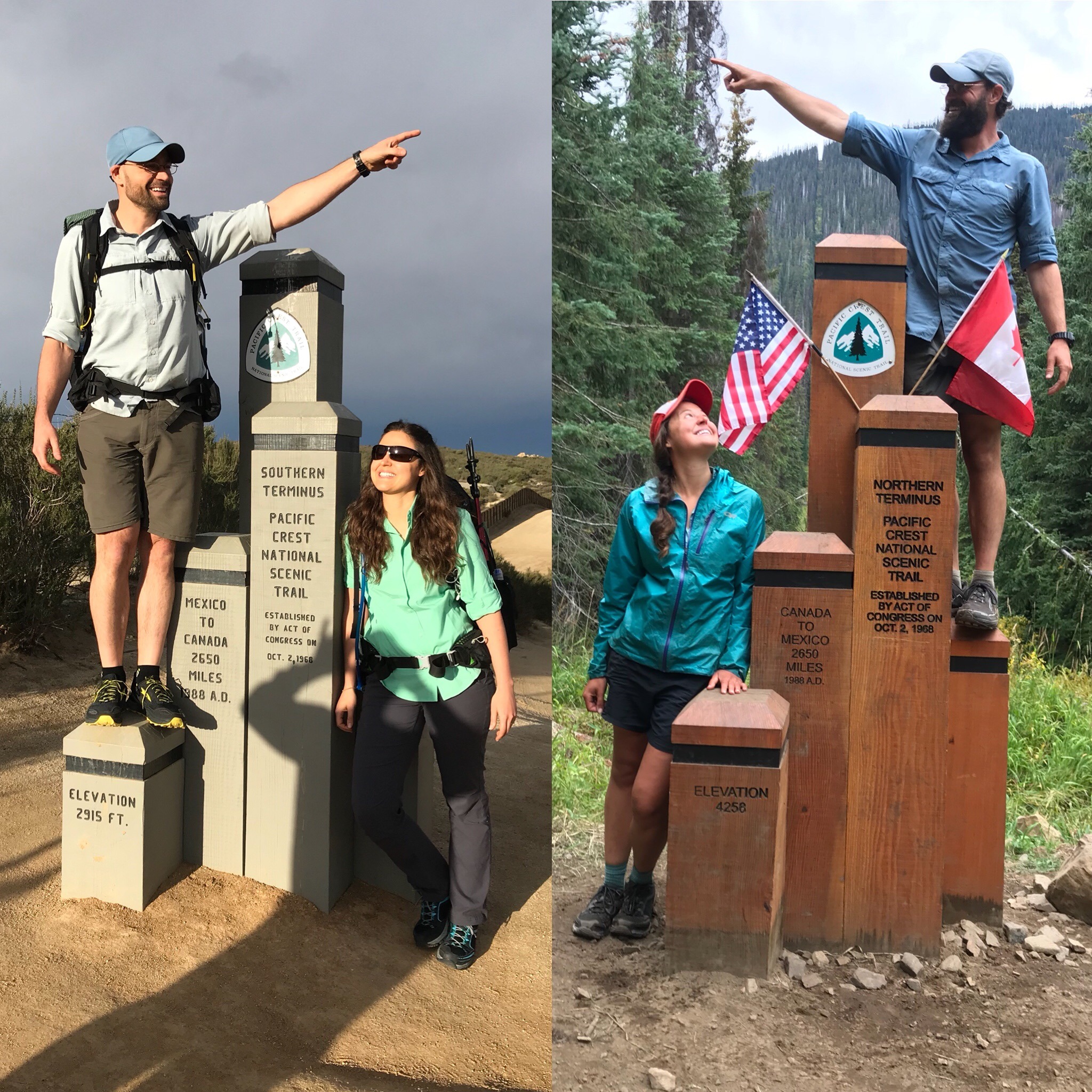
Border to glorious border!
Younger hikers may feel that their age is an advantage. And to an extent, it is. Younger hikers (age 21-30) can buffer the physical stressors better than a typical hiker in their 50’s for example.
Consider this: the single biggest age group for hikers was age 21-30 according to The Trek survey linked below. It’s a similar story for the PCT with numbers even closer to 50%.
However, foot problems, knee issues, hip pain, back pain and other ailments do not overlook youthfulness. Take a look at these numbers from The Trek Appalachian Trail abandon report in 2017.
Here’s the breakdown:
- 45% of survey responders were age 21-30
- 49% were age 31-66+ (I left out the 16-20 age group)
- 63% had foot pain
- 58% had knee pain
- 21% had back pain
- 18% had hip pain
- 15% had joint injuries (tendon, ligament) I included Achilles and Tendonitis issues at 2.1% into that figure.
The odds of you having some sort of injury or pain are against you, regardless of how spry you are.
Are You Serious About Your Hike? I Mean, Really Serious?
If you choose to not train, it means not letting your ego push you beyond your limits, knowing when to rest, forgetting what the bubble and your friends are doing, and really listening to your body. Not everyone has that level of self-restraint. Do you?
Avoid the confirmation bias feeds into your desire to do more “fun” things like debating gear choices in Facebook groups, watching hiker videos on YouTube and updating your lighter pack profile. Instead, you should spend time doing meaningful activities like working up a little sweat pre-hike to actually improve your chances of finishing the hike.
Look at Backpacker Magazine, Outside Magazine or any other industry magazine. Check out the Pacific Crest Trail Association or Appalachian Trail Conservancy and you won’t find a single article from these respected resources advocating you to skip training. Rather, they offer loads of tips and articles to help guide your training! There’s a reason for that. It’s bad advice to not train!!
Are you willing to gamble your section or thru hike or on not training? Think carefully about your response and how you might feel if/when you find yourself sidelined with an injury you could have avoided with some training.
Reasons Excuses why you didn’t train
I also find that people “don’t have time to train” is a common reason for not training all together. It’s an invalid excuse on a lot of levels. Even a single 1 hour workout leaves you 23 other hours to eat, sleep and work and play.
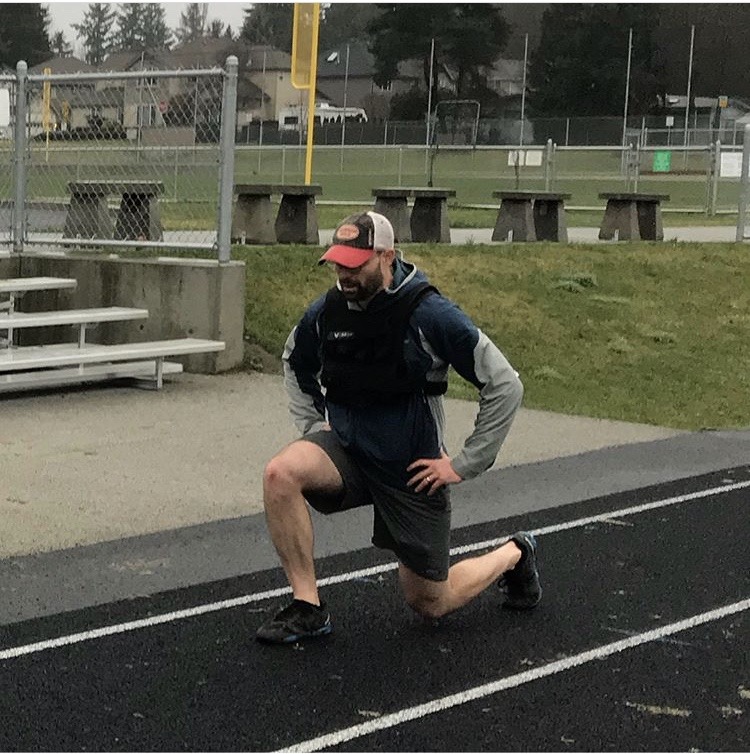
Make lunges a staple in your pre-hike training!
A full Tabata sequence only takes 16 minutes to complete, so not having time really is a poor excuse.
Fact: If you don’t have 16 minutes to workout, you need to look carefully at where you spend your time and where your priorities are.
Do some squats during your work day! Twelve per hour for an 8 hour shift is 96 squats. Toss in another 12 for lunch and your on the plus side of 100. See how easy that was?
It’s not hiking, but it will improve your general physical preparedness, which is a fancy way of saying fitness. If this epic hike you are planning is important to you, you should be willing to do what it takes to be successful. Find the time.
More Importantly…
- Skip the negative self talk around being out of shape.
- Skip the self doubt around being physically fit after getting a reality check the first few weeks on the trail.
- Bypass the regret of not training before you left.
- Start confident when you take that first step on the trail knowing you have fully prepared!
Plus, you will decrease muscle soreness as you initiate your hike and have better energy levels. As a side note, with the preparation my wife and I did, we did not experience any muscle soreness or physical issues as we adjusted to life on the PCT in 2018. She was 36 and I was 39, it can be done!
Accepted And Inherent Risk Of Hiking
No one is saying that you will experience an injury, but it’s a very real possibility. No one will tell you that you can avoid injuries all together with training. Things go wrong. Both are a real possibility and an accepted risk for hikers. I just implore you to go prepared and stack the odds in your favor with training.
Some injuries are just unavoidable, like a sprained ankle or a slip and fall. That is just part of the risk you accept once on trail. However, there are ways to help prevent common overuse injuries through fitness training before you hit the trail.
Learning how to recognize and manage aches and pains before they become a more serious problem is a valuable asset. Cruise the other articles on this site to learn more. You can grab our free download to learn valuable tips and exercises that will help make you successful.
Make the decision to train or not and be comfortable with your choice. Just approach your hike preparation with well reasoned intentions.
Solid Advice That’s Free, So Listen Up!
Hikers in the Halfway Anywhere yearly PCT surveys state they wish they had trained more before their hike. Previous hikers are handing you the keys to success, if you look pay attention. They include:
- Eating better
- Training more
- Base weight does matter
- Food choices/nutrition matters
- Taken more pictures of people
- Embrace the punches, don’t just roll with them
Not sure what to do for a workout? Reach out! I offer online personal training learn more here.
Luckily, there are a number of great workout ideas for you on this site, and more to come soon!
You can reach me info@trailsidefitness.com with any injury issues, past or present that you feel will impact your hike. Training questions are also welcome – I am happy to help!
Be sure to like our Facebook page and follow us on Instagram and YouTube.
I do sincerely hope for your success, you aspiring hiker trash.
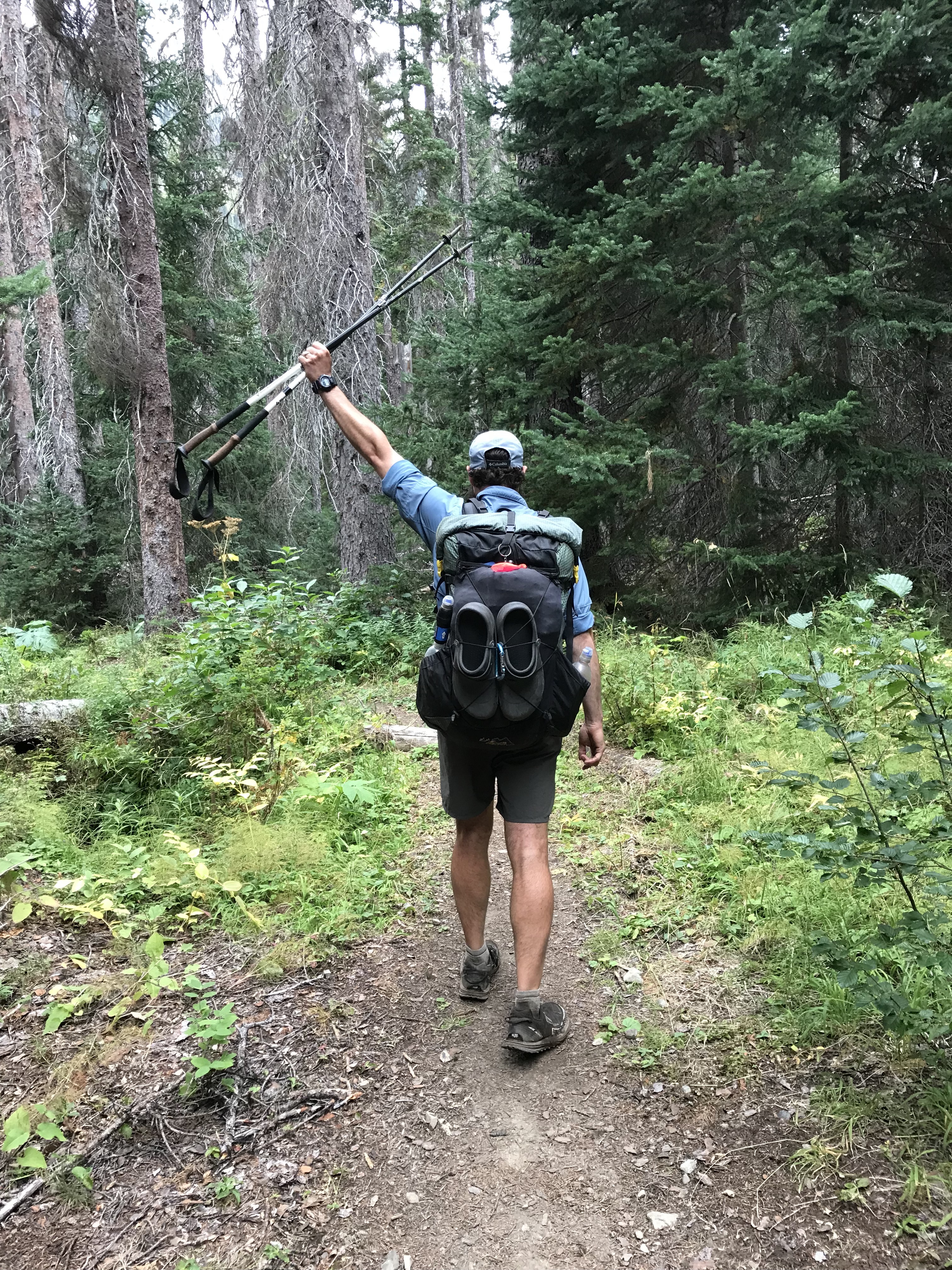
Hello, Canada! Photo taken steps from the northern PCT terminus after completing 2650 miles of life changing trail.
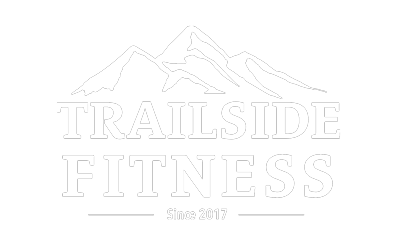
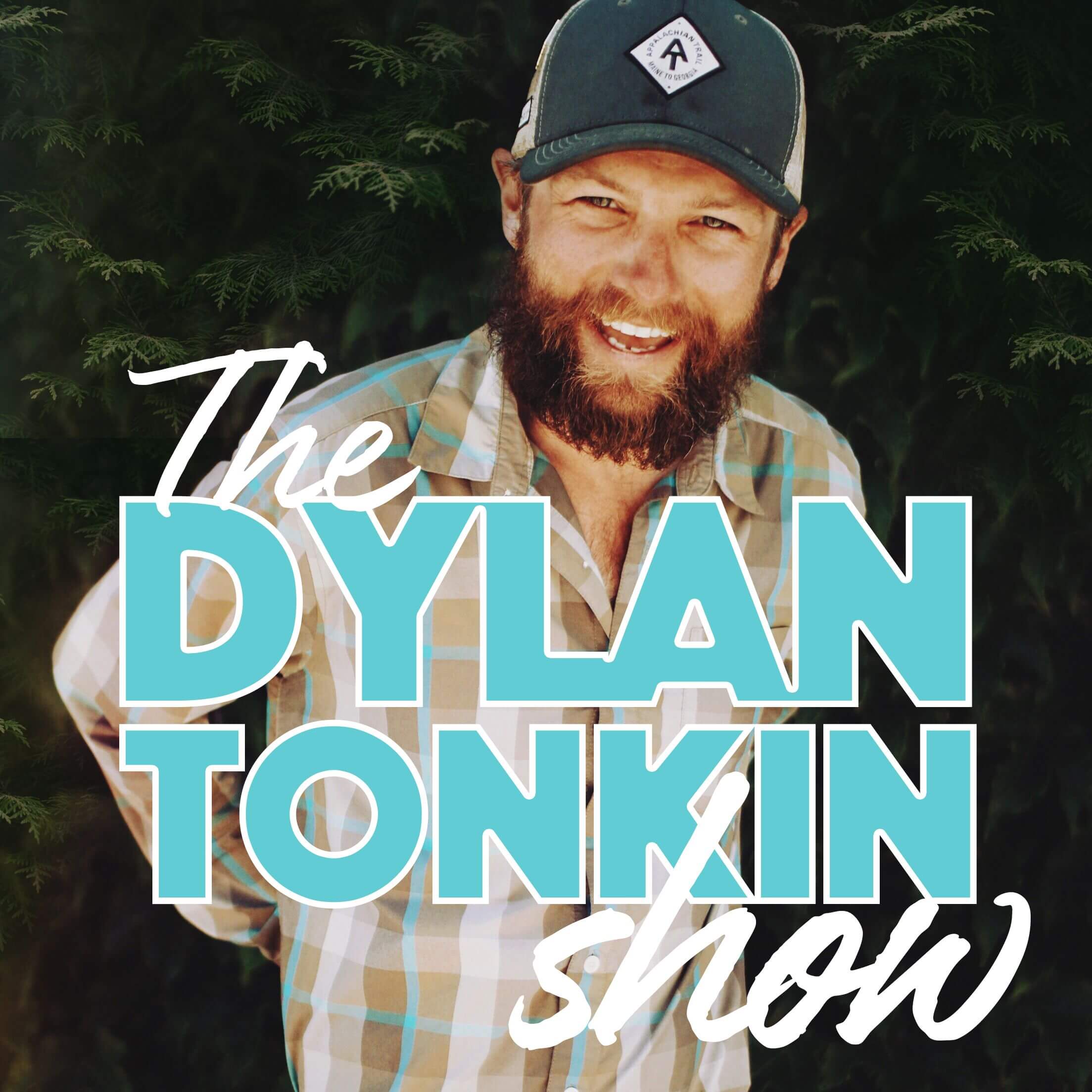
Recent Comments